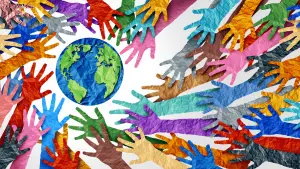Editor’s Note:
The following publication is record of an interview conducted by Aduwo Ayodele and sociology student, Afolabi Oyindamola. Amongst other topics, they discuss sociology and suicide in Nigeria.
Q – Can we meet you?
I am Afolabi Oyindamola, an undergraduate student of the Department of Sociology, University of Ibadan.
Q – Suicide and its rising agony is a recurrence in Nigeria. What are the underlying factors for the most suicide cases in Nigeria?
Well, suicide and the rising agony is a manifestion of the society at large and the institutions imbedded in it, which includes; Family, Religion, Economy, Political and Legal institutions. The actions and inactions of all these institutions have a lot to do with the suicide rates and the rising agony about the pitiful loss of lives in Nigeria.
Q -What are the warning signs for suicide ?
Despite that I have never been to the depth of a sea, I definitely think nothing is as deep as the human mind. Therefore, there may not be glaring signs for us to know that someone is contemplating suicide, or if a person has suicidal thoughts, especially those that are good at hiding their feelings because they feel nobody can help them or understand them. However, some outward signs that a person [is considering suicide] may include :
- Talking about feeling hopeless, trapped, or being alone.Saying there is no reason to go on living.
- Making a will or giving away personal possessions.
- Searching for a means of doing personal harm, such as buying a gun or cutting of oneself.
- Sleeping too much or too little.
- Eating too little or eating too much, resulting in significant weight gain or loss.
- Engaging in reckless behaviors, including excessive alcohol or drug consumption.
- Avoiding social interactions with others.
- Expressing rage or intentions to seek revenge.
- Showing signs of extreme anxiousness or agitation.
- Having dramatic mood swings.
- Talking about suicide as a way out.
Q – Is suicide more of a sociological issue than being psychological?
Yes. It is more of a sociological problem because social facts or social institutions (marriage and family institution, education, legal, political and economic institutions) which are external to the individual have the capability to put pressure on the individual or cause depression which can lead to suicide. In addition to that, sociology encompasses all other social sciences, that which include psychology, so it is appropriate to say suicide is more…sociological than…psychological.
Q – Why are Nigerian parents much unaware of the suicidal attempts going around them?
Well, to a very large extent, ignorance plays a role. Nigerian parents I believe do not recognize the existence of the subconscious or psyche of a child. So often they might fail to recognise that a child is suicidal.
There are many reasons why some parents will not notice the suicidal moves of their children. One of such is lack of spending quality time with the children.
Suicide will not just take place. Before it is carried out by any person, there are signs or shifts in the behavioral way of doing things of such a person. Parents who do not spend quality time with their children will never notice the changes in behavior of these youths… Another reason is the bossy and unfriendliness of some parents. Friendliness is the mother of open communication.
When the line of communication is not opened to express love and concerns, children, teens or the more matured adolescents will not confide in their parents to share problems relating to their grades, relationship, lifestyle etc. Without effective communication, persons attempting suicide or heavily depressed are individuals who will do whatever within their power to please their parents but prefer dying within.
Also, the aggressive pushing of the child to achieve certain goals in order to better the lives of the family plays a part. When parents who had a tough time growing up have little resources to send their children out to gain soils or knowledge, they might be unaware that they’ve pushed too hard or too much. More sadly, they might not recognize that the youth is breaking down as a result of being extremely forced to what he or she is disinterested about.
Also, socialization plays a role. The way parents are brought up will also influence how they raise their own children, which is how the vicious cycle begins and continues. The youth might be unable to protest because they would be portrayed bad. Parents who believe such psychological concepts as psyche, depression, subconscious as signs of weakness will also instill such in their children forgetting that times have changed as social media is adding so much weight to youths who are expected to grow faster than they ought to.
Q – Checking through, does the media have its way of fostering suicide?
Like I alluded to earlier, yes, I believe so. One of the ways in which the world is connected together is through social media. Social media forums such as chat rooms, blogging sites, video sites (YouTube), social networking sites (Facebook, MySpace, Twitter, Instagram) etc. have great impact on the way people interact in the society. Social media has great advantages to the society, but when it is to be related to suicide among young people, social media can not be left behind because it fosters it.
In this 21st century, and by virtue of this geographical location, young ones surf the internet more than [older] people. All the information everyone needs can be found on the internet. It is possible to check suicide victim’s mobile phones to see navigated questions on suicide, like : how to kill myself, best suicide methods, best ways to die without pains etc. from browser’s history.
The fact is that they get such information through the social media. Social media has also helped to promote fake lifestyle which bitterly brings some people into the quagmire of depression. Some people commit suicide because they were depressed due to fact that most of their friends on social media passed the message of living a comfortable life through pictures and videos which may be different from the reality.
In Nigeria, we have suicide cases that were catalyzed by the social media. A young man posted on his social media handle, “I want to kill myself”. No one took him serious. Instead of reaching out to him to help him, they gave him an insulting comments(such as, kill yourself na, to make it easy drink this, etc.), which made the case unfortunately worse. A few days later, the young man committed suicide. Cyberbullying has caused a lot of suicidal cases than it can be imagined. Directly or indirectly linked to suicide, it has been referred to as cyberbullicide.
Futhermore, youths have so much expectations placed on them in the virtual world. The urge to post pictures with cars and houses, nice clothes, better phones they’ve acquired is another catalyst. It might appear to youths as the life that everyone lives, different from that which they live. I mean, you would read the statistics about how about 50% of Nigerians live in poverty but it becomes also disturbing to locate where exactly these 50% are, because everybody is well to do online, but different offline.
Also, stating one’s opinion, especially on Twitter, or posting ones picture but having people hurl all sorts of lewd taunts because anonymity is guaranteed is another factor. There are reak humans behind the keyboard but nobody cares since the game is about who is the best savage.
Even the mainstream is at fault. Showing youths what life could be like instead of what life really is, is another point. This is why we have youths engaging themselves in actions that are premised on what they see as real, whereas are fake.
Q – What is supposed to be the role of emotional intelligence in dealing with the upswell of suicide?
Emotional intelligence is simply the ability to recognise your emotion and that of others in order to promote optimal management of emotions.
Emotional intelligence plays a great role in dealing with suicide. One of the attributes I will love to talk about is empathy. “Empathy is the capacity to understand or feel what another person is experiencing from within their frame of reference, i.e. the capacity to place oneself in another’s position.” If people feel or understand what suicidal victims go through, the uprising of suicide will reduce to the barest minimum. Parents, friends and neighbours who observe change in behavior of someone close to them and intervene is an help to prevent suicide.
Another attribute of emotional intelligence is self-awareness. Self-awareness is the process of understanding oneself, realizing what stimuli one is facing and preparing to manage oneself. This is pointing to the fact that suicide can be prevented if one understands oneself. A person who knows that he or she is depressed and has suicidal thoughts can take proactive and reactive steps. And that can be in form of speaking out or seeking help. [Although, we acknowledge that help is not always available to everyone].
There are not [many] people who are emotionally intelligent but they believe otherwise, which is why people do not even patronize therapist as much as they ought to. If parents could recognise emotions in their youthful children, they might be able to recognise it and help them handle such phases of emotional turbulence.
Q – Can social inequality, that is the political economy of Nigeria be linked as a factor to the upshot of depression – which swings people into committing suicide?
Social inequality in whatever form is definitely a very important part of this discourse. Poverty, most importantly, is a cause of depression. Leave any political statement out. People are jumping into lagoons in Lagos state of Nigeria because of debt caused by the effects of a bad political economy. While this might not be the only cause, it is a major one.
In Nigeria, the political economy can be traced to why people commit suicide. There are different factors that lead people to have the thought of committing suicide. Factors such as depression, anxiety and bipolar disorder, which are often combined with negative stresses caused by issues such as economic hardship, and other pressures.
In Nigeria, the political economy is constructed or designed in such a way to favour only the rich and to the detriment of the poor. The standard of living is very low. The struggle for survival has led many into anxiety, bipolar disorder and most importantly, depression. And when all these set in, being suicidal is not far from the best available option for the poor.
Q – What’s your advice for persons who feel uncertain to ask for help?
Well, it is hard to ask for help at times truly because there are more savages in the society than those willing to help. There have been cases where some people upload suicidal thoughts or even their own suicide opinion poll, and all they would get in return are harsh comments from people on the cyberspace. Also, some people still believe that depression and suicide isn’t ‘an African way of life’.
Even if someone opens up to them or show signs, they would still get neglected. But, I will advice anyone feeling suicidal to try and confide in someone, or even mental practitioners whose line of work is listening to others’ problems.
Q – What are the realistic roles of religious groups in preventing suicide? Knowing well that Nigerians are mostly religious.
Realistic? Seriously, they can only do so much to prevent suicide except they would be trained as religious leaders for emotional intelligence and other therapeutic skills. They can create a community of love and cohesion which is one of the functions identified by a sociologist of repute in his study of religion. Provision of palliatives, soft loans, job opportunities, and other things to make life easier. But, most importantly is at the community level for free expression of self.
Religious institutions at a point helped reduce anxiety, depression and suicidal thoughts, until most of them became business centres that encourage members to work more so as to give to their religious leaders who are believed to be intermediaries between them and the supernatural.
And the competition among religious members is just a little different from the ones among the rich and the poor in the society. Religious groups should practice more love than preach more wealth. They should not forget to preach hope too. But for a fact in Nigeria as of present, religion has been more of a disintegrating evil than a uniting force.
Q – What should be the duties of academic institutions in suppressing suicide?
Basically, academic institutions are supposed to be correctional or reorientating places. Here, students can learn what their parents cannot teach. And this is not restricted to tertiary level only but also from the basic levels of learning.
The school is the society in miniature; therefore, academic institutions should organize educative programs to enlighten students and the general public on why suicide is not an option. They can also orientate several audience through seminars and the media on the need to speak out when passing through depression, anxiety and mental disorder or probably having any suicidal thought or worries.
In addition, teachers and lecturers should be implored not to talk down at students and make them feel worthless by comparing a particular student to another.
Aggressive campaigns, inclusion in general studies programme, provision of alleviation alternatives amongst others are recommended too.
Q – What is the final thought you’d like to share as a sociologist?
If I were to state my final thought as a sociologist, it may seem unreal or unattainable because all our social institutions are polluted already, and all thanks to social media, which [makes] the current situation…worse. Gone are the days when a problem shared is half solved. These days, a problem has been redefined to ‘personal problem’. Meanwhile, there is a possibility that all the supposed problem out on the streets already have earlier been witnessed, making it fanciful to be taken serious by the public.
My thought is that this issue rests more on me and you, and the person next door. It is a blazing uprising that needs to be dealt with collective efforts. All agencies of socialisation should be humanely ; and this we can do by observing our friends and colleagues, by being ready to listen calmly without blaming them if they decide to pour out their heart to us.
It is only (God) that can eradicate completely depression and suicide, but before that, we are to help ourselves and others. It won’t be bad if we all learn about depression and suicide including the signs and what can be done as remedies. This is not the work of educational institutions or non-governmental organizations alone, but also it is the diplomatic responsibility of religious institutions. They should also do more of preaching hope, patience, perseverance and hard work rather than prosperity. This would relieve the social pressure and stress that builds up to become suicide in Nigeria.
Other Interviews with Sociology Students in Nigeria
Majoring in Sociology: Content, Branding and Media Solutions







